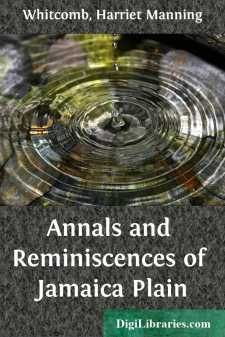Categories
- Antiques & Collectibles 13
- Architecture 36
- Art 48
- Bibles 22
- Biography & Autobiography 813
- Body, Mind & Spirit 142
- Business & Economics 28
- Children's Books 14
- Children's Fiction 11
- Computers 4
- Cooking 94
- Crafts & Hobbies 4
- Drama 346
- Education 46
- Family & Relationships 57
- Fiction 11828
- Games 19
- Gardening 17
- Health & Fitness 34
- History 1377
- House & Home 1
- Humor 147
- Juvenile Fiction 1873
- Juvenile Nonfiction 202
- Language Arts & Disciplines 88
- Law 16
- Literary Collections 686
- Literary Criticism 179
- Mathematics 13
- Medical 41
- Music 40
- Nature 179
- Non-Classifiable 1768
- Performing Arts 7
- Periodicals 1453
- Philosophy 64
- Photography 2
- Poetry 896
- Political Science 203
- Psychology 42
- Reference 154
- Religion 513
- Science 126
- Self-Help 84
- Social Science 81
- Sports & Recreation 34
- Study Aids 3
- Technology & Engineering 59
- Transportation 23
- Travel 463
- True Crime 29
Annals and Reminiscences of Jamaica Plain
Description:
Excerpt
This sketch was prepared by request to be read before the Jamaica Plain Ladies' Tuesday Club. Subsequently a desire was expressed to have it put in a more permanent form and offered for sale at a Fair for the Jamaica Plain Indian Association. Although personally reluctant to appear before the public in this way, I have allowed my desire to aid a good cause and give pleasure to my friends who have kindly received my paper to influence me in its publication.
I am indebted to "The Memorial History of Boston" to Drake's "Town of Roxbury," to Dr. Thomas Gray's "Half-Century Sermon," and to the memory of a few of the older residents for some dates and incidents given.
If any of these should prove to be inaccurate, I must rely upon the charity and courtesy of my readers for only indulgent criticism.H.M.W.
ANNALS AND REMINISCENCES OF JAMAICA PLAINTo collect and review the circumstances and events which have made our homes and those of our ancestors for many generations is more than a pleasant service. We find an interest and fascination in every step of the way, leading us, as it does, into one of the most delightful portions of our country, and introducing us to not a few of the most refined and cultivated, as well as distinguished people of New England.
There is ever a charm about old-fashioned people and places, as about old books and pictures, antique furniture and china; they affect us by the very contrast they afford with ourselves and our surroundings, even though it is with a touch of pathos and sadness.
Long years ago a much-traveled man, who knew the country well, said, "Jamaica Plain is the Eden of America." He was not a Bostonian, and our village was still a part of Roxbury, so that the suggestion of conceit and boasting over this small portion of "the Hub" could not be imputed to him.
It has often seemed to us that the loving, favoring smile of heaven rested peculiarly upon our plain, environed as it is by gently rising hills, which, with their robes of verdure and noble trees, shelter it from harsh winds, and hold it in the warmth and freedom of a pure health-giving atmosphere. Our charming lake, covering more than sixty-five acres, nestles like a gem in its western borders, mirroring forms and colors, all of beauty, and holds upon its banks some of the most delightful of our homes.
In early days it gave of its clear, soft waters for the needs of the neighboring city; while through the eastern portion of our village the quiet Stony River made glad the farms and yielded power for mill and factory.
We find that the name originally given to out village was Pond Plain, but as early as 1667, it is referred to in an official paper as the "Jamaica End of the Town of Roxbury."
There are differing opinions as to the origin of the present name; some have so far reflected upon our colonial ancestors as to intimate that a decided fondness for Jamaica rum suggested it, and it is doubtless true that the punch bowl had other uses than to be simply ornamental on the sideboards of our grandsires. Others, however, believe that it was given to commemorate Cromwell's acquisition of the island of Jamaica, in 1670, which secured to Boston numerous very valuable products. There seems, to us, to be a peculiar appropriateness to the name, as it signified in Indian "Isle of Springs," because if the brooks and springs which abound here, making the land verdant and fertile. If we cannot to-day boast of grand and stately castles, reared in the olden time, as in the mother country, with guarding moats and bastions, loopholes for crossbows and guns, — silent testimonials of opulence and power, — we yet can bring to view pictures of many a dwelling, gray and brown with weather stains and lichens and folds of ivy, which have held within their walls of oak and cedar people and events whose records thrill our hearts with patriotic pride or affectionate reverence....


